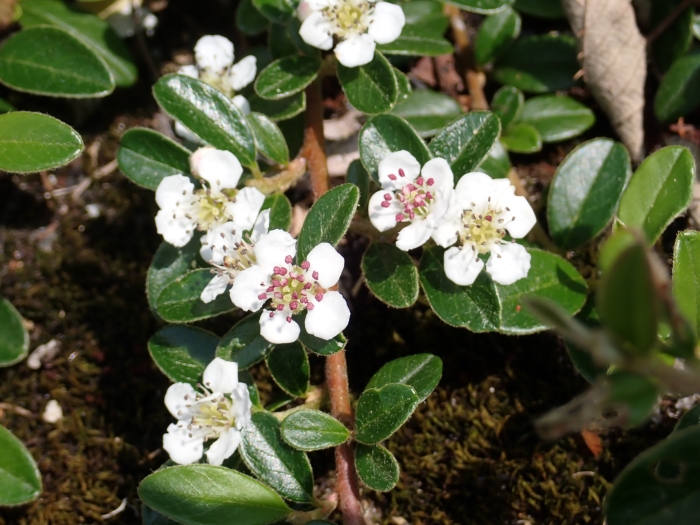Coral Beauty Cotoneaster
(Cotoneaster ×suecicus)
Coral Beauty Cotoneaster (Cotoneaster ×suecicus)
/
/

© Mara
CC BY 4.0
Image By:
© Mara
Recorded By:
Copyright:
CC BY 4.0
Copyright Notice:
Photo by: © Mara | License Type: CC BY 4.0 | License URL: http://creativecommons.org/licenses/by/4.0/ | Uploader: fluffyinca | Publisher: iNaturalist |

























Estimated Native Range
Summary
Cotoneaster × suecicus, commonly known as Coral Beauty Cotoneaster, is a semi-evergreen hybrid shrub with a moderate growth rate. It is a cross between Cotoneaster dammeri and Cotoneaster salicifolius, both of which are native to mountainous and rocky areas in Western and Central China. This hybrid typically reaches a height of 2-3 feet (0.6-0.9 meters) and spreads 6-8 feet (1.8-2.4 meters) wide. It has small, 5-petaled, pink flowers that bloom in late spring, followed by bright red berries that persist into winter, providing visual interest and food for birds.
Coral Beauty Cotoneaster is valued for its dense, mat-forming habit that makes it an excellent ground cover, especially on slopes for erosion control. It is also used in urban plantings, rock gardens, and as a low hedge. This plant is adaptable to a range of soil types, including clay, loam, and sandy soils, and prefers full sun to part shade. While it tolerates a range of drainage conditions, it thrives in well-drained soil and requires medium amounts of water once established. Gardeners should be cautious, as Cotoneaster × suecicus can be invasive in some regions, outcompeting native vegetation.CC BY-SA 4.0
Coral Beauty Cotoneaster is valued for its dense, mat-forming habit that makes it an excellent ground cover, especially on slopes for erosion control. It is also used in urban plantings, rock gardens, and as a low hedge. This plant is adaptable to a range of soil types, including clay, loam, and sandy soils, and prefers full sun to part shade. While it tolerates a range of drainage conditions, it thrives in well-drained soil and requires medium amounts of water once established. Gardeners should be cautious, as Cotoneaster × suecicus can be invasive in some regions, outcompeting native vegetation.CC BY-SA 4.0
Plant Description
- Plant Type: Shrub
- Height: 2-3 feet
- Width: 6-8 feet
- Growth Rate: Moderate
- Flower Color: Pink
- Flowering Season: Spring
- Leaf Retention: Semi-deciduous
Growth Requirements
- Sun: Full Sun, Part Shade
- Water: Medium
- Drainage: Fast, Medium, Slow
Common Uses
Bird Garden, Deer Resistant, Groundcover, Hedges, Low Maintenance, Street Planting
Natural Habitat
Originates from mountainous and rocky areas in Western and Central China
Other Names
Common Names: Swedish Cotoneaster
Scientific Names: , Cotoneaster ×suecicus, Pyrus ×sverigensis,
GBIF Accepted Name: